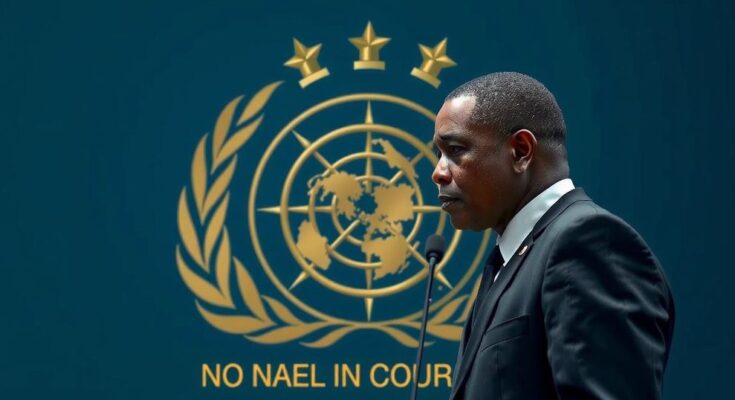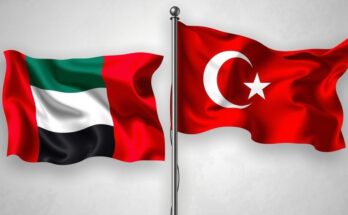On October 14, ICC prosecutor Karim A. A. Khan announced intensified efforts to investigate crimes in the Democratic Republic of Congo, particularly in North Kivu, stemming from a request by the Congolese government. With a history of ICC involvement since 2004 and continued serious human rights abuses by armed groups, the renewed investigations aim to address accountability and the impunity gap. The establishment of a special criminal court further emphasizes the need for a robust justice mechanism in the DRC, requiring support from both the ICC and international partners.
On October 14th, Karim A. A. Khan, the prosecutor of the International Criminal Court (ICC), announced a significant escalation in investigative efforts concerning the Democratic Republic of Congo (DRC), specifically targeting crimes perpetrated in the North Kivu province since January 2022. This renewed focus arises from a formal request made by the DRC government to the ICC last year, expressing the need for international assistance in addressing serious criminal activities within its borders. The ICC’s involvement in the DRC dates back to 2004, following the government’s initial plea for the court’s intervention, which led to cases against six individuals, all of whom were former leaders of armed groups. Notably, four of these suspects faced trial for crimes committed in the Ituri province between 2002 and 2003, resulting in three convictions and one acquittal. Conversely, two other cases concerning atrocities in North Kivu in 2009 failed to reach trial. Human Rights Watch has persistently urged the ICC prosecutor to hold accountable not only rebel commanders for their actions but also senior officials from Congo, Rwanda, and Uganda who have allegedly committed grave abuses. The renewed investigation by the ICC presents a critical opportunity to address the widespread lack of accountability and to combat the prevailing culture of impunity that encourages heinous acts in North Kivu, Ituri, and beyond. Ongoing violations of international humanitarian law in the DRC are alarming, with Human Rights Watch documenting severe atrocities conducted by the M23 armed group, including targeted killings of civilians, gang rapes, extensive looting, and the destruction of property. Reports indicate that in 2024, the Rwandan army, in coalition with the M23, executed indiscriminate shelling of displacement camps and other densely populated regions near Goma, exacerbating the plight of vulnerable communities. Moreover, the Congolese military, along with allied militias, has placed displaced individuals at greater risk by positioning heavy artillery near these camps while committing further acts of murder and sexual violence against civilians. In his recent statement, Mr. Khan emphasized his commitment to investigating all warring factions, irrespective of the Congolese government’s request to concentrate solely on the M23. It is imperative that ICC member nations acknowledge the growing demands placed upon the court and extend their support to ensure the ICC can effectively fulfill its mandate across various ongoing investigations. Furthermore, it is essential to recognize that the ICC functions as a court of last resort, and therefore, it is unrealistic to expect it to address all aspects of justice within the DRC. The ICC prosecutor appropriately commended the DRC authorities for their initiative to establish a special criminal court, which is a pivotal step towards instituting a comprehensive internationalized justice mechanism. This mechanism is imperative at this juncture, as it would complement the efforts of the ICC and domestic judicial bodies, effectively addressing the critical impunity gap that has persisted for far too long. It is crucial for the Congolese government to expedite the implementation of this project with the invaluable support from the ICC and other international allies.
The International Criminal Court (ICC) has been investigating allegations of serious crimes in the Democratic Republic of Congo (DRC) since its establishment in 2002. The court’s jurisdiction was activated by a referral from the DRC government in 2004, which sought help in prosecuting war crimes and crimes against humanity stemming from prolonged conflicts marked by political instability and armed group violence. Over the years, despite the ICC holding trials against a handful of rebel leaders, accountability remains minimal, and calls for broader investigations encompassing other perpetrators, including high-ranking government officials, have intensified. Currently, the DRC continues to grapple with severe human rights violations, particularly in conflict-prone regions like North Kivu, where armed groups, including the M23, continue to wreak havoc.
The International Criminal Court’s renewed focus on the Democratic Republic of Congo marks an essential step towards addressing ongoing grave human rights abuses in the region. It highlights the ICC’s commitment to investigating not only non-state actors but also alleged violations by state officials. With the Congolese government’s initiative to create a special criminal court, there is hope for a more comprehensive approach to justice, complementing the work of the ICC and potentially closing the longstanding impunity gap. However, timely execution of these initiatives, bolstered by international support, will be crucial for meaningful progress in restoring accountability in the DRC.
Original Source: www.hrw.org




